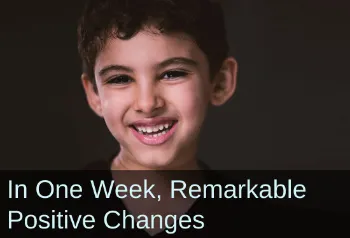Primitive Reflex Integration Case Studies
9-Year-Old Is Helped with Bedwetting; Posture, Energy, Relaxation, and Coordination Improve
One week of rhythmic movements and reflex integration makes a big difference
This 4th grader wet the bed nightly, and had issues with coordination, posture, core strength, and fatigue. His mother provided daily rhythmic movements and reflex integration, and in a single week he had demonstrated great gains in all areas—and he only wet the bed once!
Submitted by Ashley Hartley, OTR

| Before | After |
|---|---|
| Often clumsy | Demonstrating more precise and coordinated movements |
| Fidgets | Less fidgety |
| Poor posture | Sits/stands with improved posture |
| Poor core strength and fatigues easily | Less sluggish and seems to have more energy |
| Wet the bed nightly | Only wet the bed once in a week |
WJ, my son, is a 9-year-old boy who is about to start the 4th grade. He is very smart and is a good student. He exhibits challenges such as poor core strength, shrunken posture, fatigues easily, slothful, appears clumsy, is fidgety, and he has trouble with focus. He also still wets the bed at night, which has led to issues with poor self-esteem. I feel as if his challenges are inhibiting his full potential academically.
Because of WJ’s current difficulties, I chose to lead him through Brain Tune ups and all rhythmic movements [from the Brain and Sensory Foundations course] to prepare his mind and body for optimal performance as well as teaching him tools he can use independently. WJ demonstrates a retained STNR [Symmetrical Tonic Neck Reflex], Babkin, Babinski and Spinal Galant, so I chose to focus on integrating these specific reflexes.
WJ has been participating in sessions with me for one week, and WJ is already demonstrating more precise and coordinated movements. When asked, WJ reports feeling “relaxed and stretchy” at the end of each session. As his mother, I have noticed he is less fidgety and sits/stands with improved posture. He is less sluggish and seems to have more energy. In fact, he asked to go on a walk with me today instead of choosing to stay home. He has only wet the bed one time in the last week, when previously it has been a nightly issue. At the end of each session, I have also noticed less of a response or no response when reflexes are stimulated.
While working with WJ, I have learned the importance of practicing Heart Connection, [from the Brain and Sensory Foundations course] as when I am intentional in using it, we have much better results. When I feel irritated or frustrated if he doesn’t focus or perform a movement correctly, it is more challenging. I have also learned that clients may not get a movement right, and you have to be creative in your sessions if something is too challenging, not perceived as fun or they are simply unable to perform the way you want them to. I am now more mindful that this experience should be a positive one, we can be creative, and it is very helpful in so many areas of life and function!
*Disclaimer: The activities in the Brain and Sensory Foundations curriculum make use of the natural processes of neuroplasticity and development that are innately wired in the design of human beings to promote maturity and function. These activities appear to calm, organize, and mature the neuro-sensory-motor systems just as we see in the healthy development of human infants. Individual results may vary, and we do not claim to offer a diagnosis or cure for any specific condition or disorder. The Brain and Sensory Foundations activities appear to improve overall functioning resulting in measurable improvements for a range of conditions as demonstrated in over 1800 case studies from participants.

